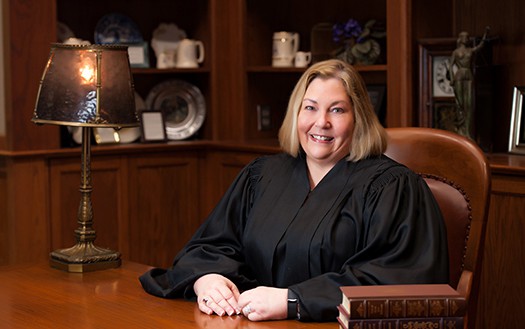What is your legal/judicial background?
Currently, I serve as the Chief Judge of the Kansas Court of Appeals (since January 9, 2017). I’ve served as: Court of Appeals Judge (2011-Present); Overland Park Municipal Judge (1991-2011); Assistant U.S. Attorney-District of Kansas (1989-1991); and First Assistant City Attorney (1982-1989).
I received my bachelor’s (a triple-major in psychology, political science and personnel administration) from the University of Kansas in 1979. I graduated from the University of Kansas School of Law in 1982.

In what NJC course(s) do you teach? What subjects do you teach within that course?
I’ve primarily taught Special Court Jurisdiction and subjects such as: Traffic Law; Immigration Consequences of Criminal Convictions; Jury Management; You Be the Judge: Defenses in Traffic Cases; and Driver’s License Law (including immigrant issues and NAFTA.) I have also taught “on the road” for NJC on the topic of Disproportionate Minority Confinement and Racial Profiling.
Do you teach elsewhere? If so, where? What subjects do you teach there?
I have taught classes for the ABA on Mock DUI Trial, Traffic Law, Non-Citizen Issues in Your Court, Law of Speed Check Instruments, Disproportionate Minority Confinement and Racial Profiling (today would probably best be called Implicit Bias in the Criminal Justice System) and Judicial Ethics.
I have taught for my state office of judicial administration in the same areas above plus Law Regarding Methods of Transportation, Our Constitution, Appellate Advocacy and Preparing a Winning Oral Argument.
I have taught for the Kansas Bar Association, every local bar association in my state, and the Kansas Women Attorneys Association on topics such as: Kansas Appellate Update; Collateral Consequences of Criminal Convictions; The Judicial Branch and the Rule of Law in a Constitutional Democracy; Voting Rights Law; Imposter Syndrome and How it Can Sabotage Your Career; What a State Judge Needs to Know About Bankruptcy; Social Media and Judicial Ethics; Honor the Law: The Importance of Civility; and Sham Marriages.
I’ve also taught the Ohio Municipal Judges Association on Racial Profiling and Disproportionate Minority Confinement and the Overland Park Leadership Group on Implicit Bias and the Importance of Diversity.
What do you find to be the most challenging aspect of teaching judges at the NJC?
Finding the time away from my judicial duties to prepare course materials and keep them up to date.
What aspect of teaching at the NJC do you enjoy most?
I love meeting and interacting with judges from around the country and around the world. Even though I come to the College to teach, I always learn just as much, if not more, from the participants and other faculty members.
What do you find most rewarding about teaching at the NJC?
The interactions with other judges and the staff at the College. It is such a nurturing environment for judges. It is great to see judges interact and learn new ways of doing things and different perspectives on common issues.
What is the funniest thing that has happened to you in an NJC classroom?
I can’t remember anything particularly funny. I usually bring University of Kansas Jayhawk basketball T-shirts to throw out during class for a particularly good comment or question. One year the winner was a North Carolina judge and a Tar Heels fan who was quick to say he would use it to wash his car!
What does The National Judicial College mean to you?
There is no doubt in my mind that I would not be the judge I am today without it. It was there for me when I was a new judge – even though I didn’t think I needed it. That attitude was reversed the minute I stepped into the first class. It was there for me when I became a presiding judge in my municipal court and returned to learn about leading a court. I would not have a professional network of judges and court administrators all over the country available to answer my questions if it weren’t for the NJC. So the College has done so much for me … and the fact that the College chose to honor me with this award (2016 V. Robert Payant Award for Teaching Excellence) is astounding to me. I should be publicly thanking them, not vice versa.

CHICAGO – The American Bar Association Judicial Division announced recently that TheNational Ju...

The National Judicial College is mourning the loss of former faculty member Judge Duane Harves, who passed ...

As the world manages an evolving natural environment, The National Judicial College announced today that it...

Do’s Manage your cases systematically Devise a system that works for you and your organizational...

After 22 years of teaching judges, Tennessee Senior Judge Don Ash will retire as a regular faculty member a...